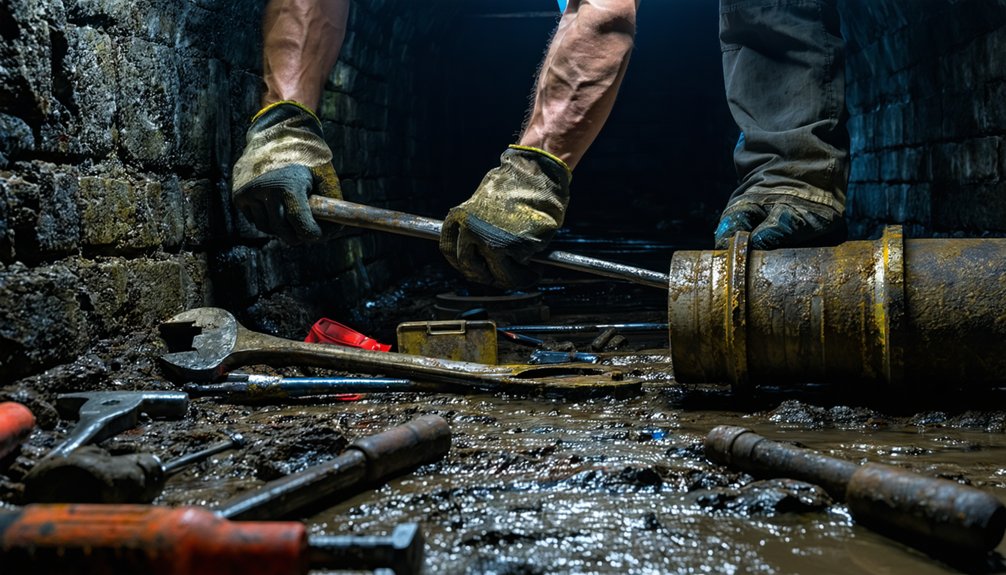Finding trustworthy sewer repair contractors involves evaluating their credentials and experience, ensuring they are licensed and insured. A contractor with over 15 years of experience is often better equipped to handle complex issues. Customer feedback, especially from verified online reviews, provides insight into reliability and service quality. Additionally, transparent pricing prevents unexpected charges and fosters trust. Those seeking reliable service will benefit from exploring the nuances of contractor selection further in this discussion.
Evaluating Credentials and Experience
When seeking a sewer repair contractor, it is essential to analyze their credentials and experience to guarantee a successful outcome. A licensed and insured contractor provides assurance that they comply with industry standards, protecting property from potential damage. Contractors with over 15 years of experience are particularly valuable, as their expertise allows them to tackle complex sewer line problems effectively, ensuring reliable sewer repair services.
In addition, utilizing state-of-the-art commercial equipment is vital for efficient resolutions to plumbing system issues. Prospective clients should also examine online reviews and ratings, as these insights reveal the contractor's reliability and quality of service. Recommendations from friends or family can further guide one to trustworthy service providers. By carefully evaluating these factors, property owners can confidently select a sewer repair contractor equipped to address their needs and minimize future risks.
Importance of Customer Feedback
Customer feedback plays an essential role in the selection process for sewer repair contractors, offering valuable insights into their reliability and service quality. By examining online reviews on platforms like Google and Yelp, potential clients can gauge customer satisfaction levels and assess the quality of service provided. Reputable contractors typically showcase high ratings and positive comments, reflecting their commitment to excellence. Verified reviews often highlight specific strengths and weaknesses, allowing homeowners to evaluate contractors' expertise in addressing common sewer line issues such as clogs and leaks. Additionally, recommendations from friends and family serve as trusted sources of information, leading to more reliable choices. Contractors with a strong history of positive feedback demonstrate their dedication to customer service, which is vital for ensuring timely and effective repairs to prevent further plumbing issues. Therefore, leveraging customer feedback is essential for informed decision-making in selecting sewer repair professionals.
Transparency in Pricing and Services
Transparency in pricing and services is a crucial factor in establishing trust between homeowners and sewer repair contractors. Trustworthy contractors prioritize upfront pricing to prevent unexpected charges, ensuring clarity from the outset. Many reputable professionals offer free assessments to diagnose issues with slow drains or sewage backups, allowing homeowners to grasp potential costs before committing. For instance, snaking a main sewer line typically costs around $250, emphasizing the necessity for clear communication regarding service fees. Additionally, emergency plumber rates average $150 per hour, often accompanied by extra trip fees; consequently, these should be detailed in advance. Homeowners should seek contractors who provide thorough quotes that itemize labor, materials, and any other charges. By fostering transparency, contractors can build confidence, creating a solid foundation for lasting relationships with clients and ensuring a satisfactory repair experience.
Frequently Asked Questions
Does Homeowners Insurance Cover Sewer Line Repair?
Homeowners insurance typically does not cover sewer line repairs due to policy limitations, such as wear and tear or neglect. However, sewer coverage may apply for sudden events like tree root intrusions. Homeowners should be aware of exclusions explained in their policies. The claim process often requires documentation of regular maintenance and may involve deductible impacts on repair costs. Emergency repairs can lead to contractor selection challenges, emphasizing the importance of maintenance tips for prevention.
Is Trenchless Sewer Repair Worth It?
Trenchless sewer repair is often worth the investment due to its numerous advantages. The installation process uses advanced trenchless technology, minimizing environmental impact and reducing restoration costs. With a competitive cost range and long-term durability of pipe materials, homeowners benefit from enhanced property value. Repair timelines are considerably shortened, and maintenance tips are easier to follow. Ultimately, the cost benefits and efficiency make trenchless sewer repair an appealing option for many homeowners.
How Much Does It Cost to Replace a Sewer Line in a House?
The cost to replace a sewer line in a house varies greatly, with replacement costs typically ranging from $3,000 to $25,000. Installation expenses include material prices and labor fees, averaging $50 to $200 per hour. Additional costs may arise from inspection services, damage assessments, and municipal regulations, potentially adding $200 to $1,500. Homeowners can explore warranty options and financing solutions to manage these expenses effectively during the sewer line replacement process.
What Is the Life Expectancy of a Sewer Line?
The life expectancy of a sewer line varies, typically ranging from 50 to over 100 years, influenced by materials such as clay, cast iron, and PVC. Proper sewer line maintenance, including regular inspections and understanding common sewer issues, can greatly extend longevity. Homeowners should be aware of signs of damage and undertake preventative measures. Environmental impact and plumbing regulations also play vital roles in determining the lifespan of sewer lines, alongside the chosen trenching methods.


